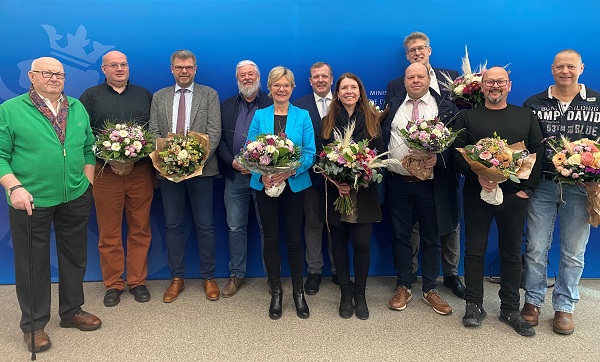 (Pictured centre, in light blue jacket) Martine Hansen, Luxembourg's Minister of Agriculture, Food and Viticulture;
Credit: MA
(Pictured centre, in light blue jacket) Martine Hansen, Luxembourg's Minister of Agriculture, Food and Viticulture;
Credit: MA
On Monday 29 January 2024, Luxembourg's Minister of Agriculture, Food and Viticulture, Martine Hansen, met with representatives of the Lëtzebuerger Landesuebstbauveraïn and the Fédération Horticole Luxembourgeoise.
According to the Agriculture Ministry, this exchange made it possible to review the important current issues which condition the development of fruit growing, market gardening and horticulture.
Among the major challenges to the takeoff of local fruit and vegetable production are better access to irrigation water and the possibility of building agricultural greenhouses. Minister Hansen expressed her desire to "move forward in these themes, the diversification of agriculture being a priority of national agricultural policy". She said that she was open to organising a second edition of the "Waasserdësch" meeting with the Ministry of the Environment, Climate and Biodiversity and the sector.
According to Minister Hansen, framework conditions must be created that allow farmers to use innovative horticultural irrigation techniques and harvest rainwater, based on the results of recent pilot projects and feedback. She added that she intends to address the issue of building permits in green zones for agricultural and horticultural operators at the "Landwirtschaftsdësch" meeting on 4 March 2024.
Monday's meeting also highlighted that fruit growing and horticulture need to be at the forefront of innovative growing techniques. The Lëtzebuerger Landesuebstbauveraïn and the Fédération Horticole Luxembourgeoise reiterated their needs for advice and specialised continuing training. Minister Hansen confirmed that analyses were underway to broaden the skills of the Wine Institute (Institut Viti-Vinicole - IVV) to the fruit and horticultural sectors to make it the central point of contact to support these sectors.
Minister Hansen and the sector representatives also discussed more flexible administrative procedures for the recruitment of seasonal labour and the promotion of local fruits and vegetables in collective catering.









